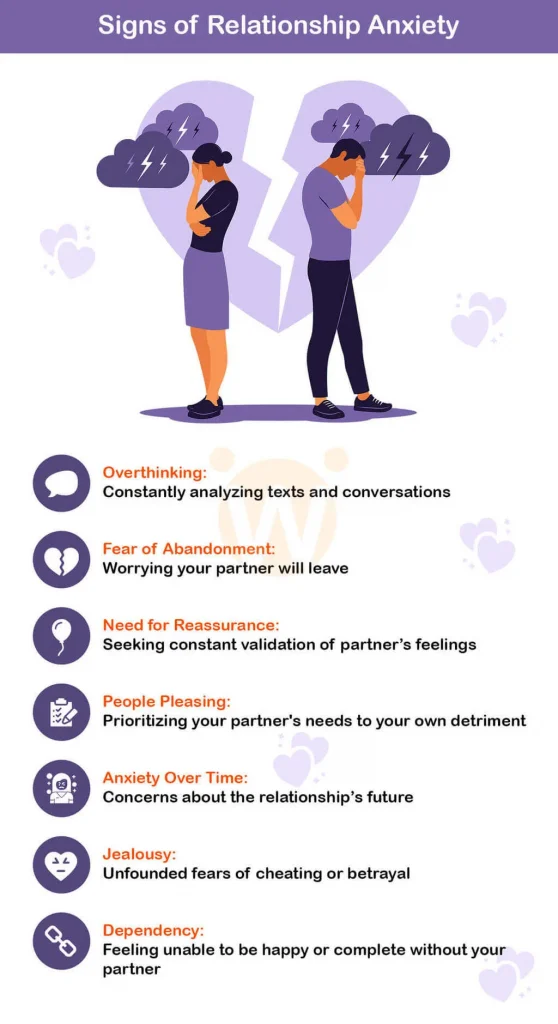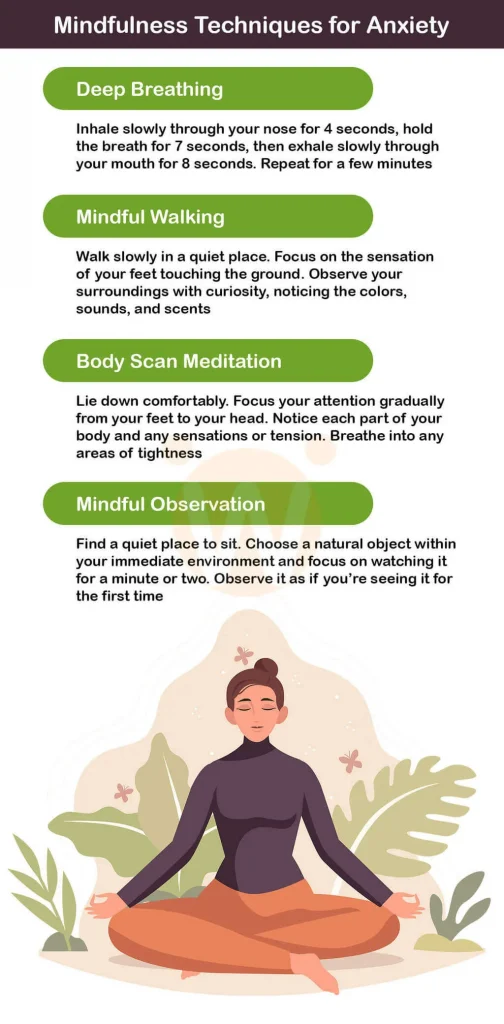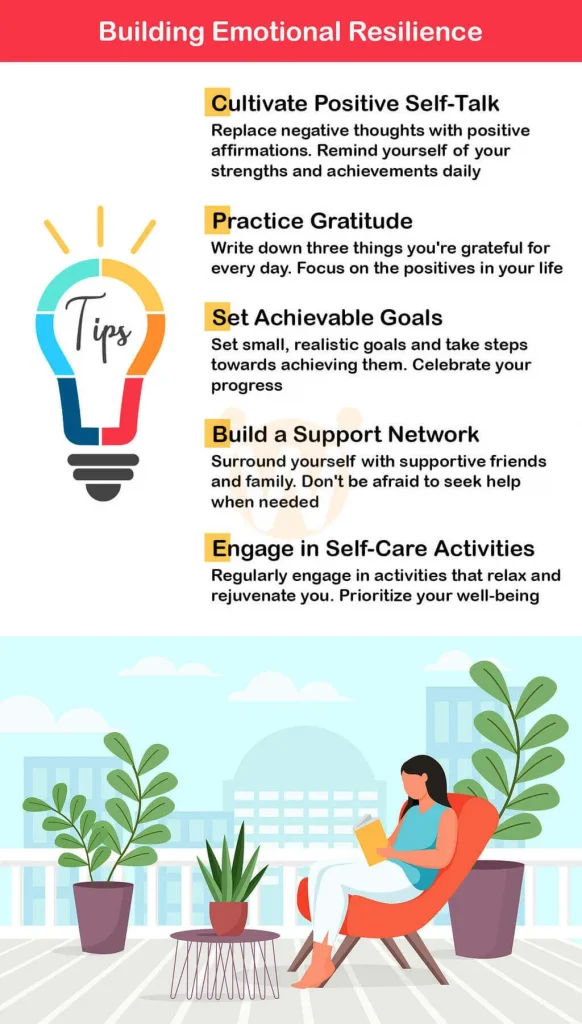Coping with Relationship Anxiety: Techniques and Tips
By Prapoorna M
Last Updated: January 23, 2024
Have you ever found yourself in a relationship where, despite everything seemingly going well, a nagging sense of worry and doubt lingers in the background? Where the question, “Are we okay?” seems to echo in your thoughts more often than you’d like to admit? If this resonates with you, you’re not alone. Welcome to the world of relationship anxiety, a journey that many of us embark on, often without even realizing it.
Relationship anxiety is that persistent whisper of uncertainty that can shadow even the most loving and stable relationships. It’s the uninvited guest at the dinner table of your romantic life, subtly influencing your thoughts and actions. This phenomenon, as widespread as it is, often goes unspoken, leaving many to navigate its choppy waters without a compass.
Understanding Relationship Anxiety
What is Relationship Anxiety?
Have you ever felt a knot in your stomach when your partner takes a bit too long to text back? Or maybe you’ve caught yourself constantly worrying about the future of a perfectly healthy relationship. This is relationship anxiety. It’s more than just occasional worries; it’s an ongoing sense of unease about your romantic relationship. Relationship anxiety often lurks beneath the surface, manifesting in various ways, from mild apprehension to overwhelming fear.

Common Signs and Symptoms
Recognizing relationship anxiety can be tricky, as it often disguises itself in behaviors and thoughts we mistakenly consider ‘normal’ in love. Here are some telltale signs:
- Overthinking: Ruminating over every text, every conversation, and reading too much into small actions.
- Need for Reassurance: Seeking constant validation and assurance from your partner about their feelings towards you.
- Fear of Abandonment: Worrying excessively that your partner will leave or lose interest.
- People-pleasing Tendencies: Often putting your partner’s needs above your own to the point of neglecting your well-being.
Causes of Relationship Anxiety
The roots of relationship anxiety are often complex and deeply personal. Some common causes include:
- Past Traumas: Previous experiences of heartbreak or betrayal can leave lasting scars, making it difficult to trust again.
- Attachment Styles: The way we were cared for in childhood can profoundly impact how we form attachments in adulthood. Inconsistent or neglectful care can lead to anxious attachments in relationships.
- Self-Esteem Issues: Sometimes, the problem lies within, where feelings of unworthiness or inadequacy fuel our relationship fears.
Strategies for Coping with Relationship Anxiety
Open Communication
Communication is the bridge that connects two hearts. It’s vital to express your feelings and fears openly with your partner. This doesn’t mean just talking, but also listening – truly hearing and understanding each other’s perspectives. Healthy communication can diffuse anxiety and build a stronger, more empathetic relationship.
Also Read: Better ways to communicate in relationships
Comparison of Communication Styles
| Communication Style | Characteristics | Impact on Relationship |
|---|---|---|
| Passive | Avoids expressing opinions or feelings and tends to comply with the desires of others. | Can lead to misunderstandings and resentment; the needs and desires of the passive partner often go unmet. |
| Aggressive | Tends to dominate conversations, often speaks in a loud and demanding voice. | Can create an environment of fear or discomfort; prevents open dialogue and mutual respect. |
| Passive-Aggressive | Avoids direct confrontation but expresses anger or frustration indirectly, often through sarcasm or backhanded comments. | Leads to confusion and mistrust, as true feelings and intentions are hidden. |
| Assertive | Communicate needs and desires clearly and respectfully without violating the rights of others. | Fosters a healthy, respectful, and understanding relationship environment; encourages open and honest dialogue. |
Mindfulness and Presence

Practicing mindfulness is like giving your mind a break from the constant chatter of anxiety. Techniques such as deep breathing, meditation, or simply being present at the moment can help calm your thoughts and center your emotions. It’s about learning to appreciate the now rather than getting lost in worries about the past or future.
Discover more about mindfulness techniques and their benefits in our article on How to Improve Attention and Concentration in Studies.
Self-Care and Maintaining Independence
Remember, you’re an individual first. Engaging in personal hobbies, nurturing your interests, and spending time with friends or family are essential for your well-being. They remind you of your uniqueness outside of your relationship. Self-care is not selfish; it’s necessary.
Learn the importance of self-care in our detailed article on Physical Impact of Stress.
Building Trust and Security
Trust is the foundation of any strong relationship. Building trust takes time and involves being reliable, consistent, and transparent with each other. It’s about small acts of kindness, understanding, and respect that accumulate over time, solidifying your bond.
For deeper insights on building trust, read our piece on Rebuilding Trust in Relationships.
Professional Support
Sometimes, we need a little help from those who are trained to provide it. Seeking professional guidance from therapists or counselors can be a game-changer. They can offer unbiased insights and equip you with strategies to manage your anxiety effectively.
Understand the benefits of therapy in our article on Online Counseling.
Enhancing Emotional Resilience

Boosting Self-Esteem
Self-esteem is the backbone of how we perceive and interact with the world. When it’s strong, we view challenges, including those in relationships, with confidence and clarity. Here’s how to nurture it:
- Affirmations: Start your day with positive affirmations. Simple phrases like “I am worthy of love and happiness” can set a positive tone for the day.
- Accomplishments Diary: Keep a diary of your accomplishments, no matter how small. Reflecting on these can be a great reminder of your worth.
- Set Realistic Goals: Achieving goals, even small ones, can significantly boost your self-confidence. Set achievable targets and work towards them.
- Surround Yourself with Positivity: Choose to spend time with people who uplift you. Positive energy can be contagious and immensely beneficial for your self-esteem.
For additional strategies on enhancing self-esteem, check out How to Boost Your Self-Esteem After a Breakup.
Overcoming Negative Thoughts
Our thoughts have a powerful impact on our emotions. Here are strategies to challenge and replace intrusive, negative thoughts:
- Mindful Awareness: Recognize when a negative thought appears. Acknowledge it, but don’t judge it. Visualize it floating away like a leaf in a stream.
- Challenge Pessimistic Thoughts: Ask yourself, “Is this thought based on facts or feelings?” Challenge these thoughts with evidence from your experiences.
- Thought Replacement: Replace negative thoughts with positive ones. For instance, switch “I’m not good enough” to “I am worthy and capable.”
- Gratitude Journaling: Write down things you’re grateful for. Gratitude can shift your focus from what’s wrong to what’s right in your life.
Read about managing negative thoughts in our resource on How to Stop Over-Apologizing.
Practicing Relaxation Techniques
Reducing anxiety levels can be achieved through simple relaxation techniques. These practices can help calm your mind and body, making it easier to cope with relationship stress.
- Deep Breathing: Practice deep breathing exercises. Inhale slowly through your nose, hold for a few seconds and exhale slowly through your mouth.
- Progressive Muscle Relaxation: Tense and relax each muscle group in your body, starting from your toes and working your way up to your head.
- Mindful Meditation: Allocate a few minutes each day for mindful meditation. Focus on your breath and gently bring your mind back when it wanders.
- Gentle Yoga: Engage in gentle yoga stretches. Yoga can improve your body’s relaxation response and reduce anxiety.
Navigating Relationship Challenges
In relationships, challenges are inevitable, but how we handle them can make all the difference. In this section, we’ll explore practical strategies for dealing with jealousy and insecurity, setting healthy boundaries, and understanding and responding to your partner’s needs. These are essential skills for maintaining a healthy, balanced relationship, and at Wellness Hub, we’re here to guide you through mastering them.
Dealing with Jealousy and Insecurity
Jealousy and insecurity are common emotions that can create anxiety in relationships. Here’s how you can manage these feelings:
- Understand the Root Cause: Reflect on what triggers your jealousy or insecurity. Is it a past experience, low self-esteem, or something your partner is doing?
- Communicate Openly: If certain actions from your partner trigger these feelings, talk about it calmly and clearly. Avoid accusations and focus on how these actions make you feel.
- Trust Building Exercises: Engage in activities that build trust. It could be as simple as keeping promises or being consistent in your actions and communication.
- Self-Reflection: Work on building your self-esteem. Remember, your value in a relationship is not dependent on anyone else but you.
Also Read: Combat jealousy in a relationship with these tips. It works!
Setting Healthy Boundaries
Boundaries are crucial for any healthy relationship. They help you understand where you end and where your partner begins.
- Identify Your Boundaries: Spend some time understanding what you are comfortable with in different aspects of the relationship – emotionally, physically, and digitally.
- Communicate Your Boundaries: Once you know your boundaries, communicate them to your partner clearly. Remember, it’s not about making demands but about mutual respect.
- Respect Their Boundaries: Just as you want your boundaries respected, ensure you respect your partner’s boundaries too.
- Be Flexible and Understanding: Boundaries can change. Be open to discussing them as your relationship grows and evolves.
For more on setting healthy boundaries, visit Why Saying No in a Relationship Is a Good Thing – Setting Boundaries in a Relationship.
Understanding and Responding to Partner’s Needs
A key part of any relationship is understanding and responding to your partner’s needs, which requires empathy and support.
- Active Listening: Listen to understand, not to respond. Pay attention to what your partner is saying and how they are feeling.
- Empathize with Their Feelings: Put yourself in your partner’s shoes. Understanding their perspective can help you respond more effectively to their needs.
- Provide Support: Sometimes, all your partner needs is to know you’re there for them. Offering support can be as simple as being present or giving a helping hand when needed.
- Check-In Regularly: Regular check-ins can help keep the lines of communication open. It’s a simple way to ensure both partners feel heard and valued.
Practical Activities for Couples
Building a strong, healthy relationship is not just about navigating challenges; it’s also about actively creating joyful, meaningful connections. In this section, we’ll explore interactive exercises and relationship-building challenges that can enhance the bond between you and your partner.
Interactive Exercises for Couples
Engaging in interactive exercises can significantly strengthen your bond and improve communication. Here are some activities to try together:
- Weekly ‘Check-In’ Dates: Set aside a regular time each week for a ‘check-in’ date. Use this time to talk about your week, discuss any concerns, and share your joys and challenges.
- The Appreciation Game: Take turns to express what you appreciate about each other. This can range from simple acts of kindness to more profound aspects of your partner’s personality.
- Dream Planning Session: Share your dreams and aspirations with each other. This can be a fun way to plan future adventures and support each other’s goals.
- Cooking Together: Choose a recipe, shop for ingredients together, and cook a meal. This activity requires teamwork and communication, and you get to enjoy a delicious meal together afterward!
Also Read: The best hobbies for couples in a relationship
Relationship Building Challenges
Challenges or tasks can add an element of excitement and growth to your relationship. Here are a few to consider:
- Gratitude Challenge: For a month, write down one thing each day that you’re grateful for in your relationship. Share these with each other at the end of the month.
- Communication Challenge: Spend a week practicing active listening. This means fully focusing on your partner when they speak without planning your response.
- Kindness Challenge: Each week, do one unexpected kind act for your partner. It could be as simple as leaving a loving note or preparing their favorite coffee in the morning.
- Digital Detox Challenge: Commit to an evening or a day each week without screens. Use this time to connect with each other without digital distractions.
Weekly Relationship Building Challenges
| Week | Challenge | Expected Outcome |
|---|---|---|
| 1 | Gratitude Logging | Enhances appreciation and acknowledgment of each other’s contributions to the relationship. |
| 2 | Active Listening Exercise | Improves communication and understanding, ensuring both partners feel heard and valued. |
| 3 | Digital Detox Evening | Fosters deeper connection and presence, free from digital distractions. |
| 4 | Surprise Date Night | Adds excitement and spontaneity, reinforcing the joy in the relationship. |
| 5 | Shared Hobby Day | Encourages bonding over shared interests, enhancing companionship. |
| 6 | Love Letter Exchange | Deepens emotional intimacy and expression of affection. |
| 7 | Relationship Goals Planning | Aligns aspirations and dreams, promoting teamwork and future planning. |
| 8 | Compliment Day | Boosts self-esteem and mutual admiration, strengthening the emotional bond. |
Staying Informed and Connected
As we near the conclusion of our journey through understanding and coping with relationship anxiety, it’s important to emphasize the value of staying informed and connected. At Wellness Hub, we believe in empowering our readers with not just strategies and tips but also with knowledge and community support. Let’s delve into how you can continue to grow and nurture your relationships with the latest research and community engagement.
Join discussions and learn more in our article on Relationship Counseling Online
Latest Research and Insights
Staying updated with the latest research in the field of relationship psychology can provide you with new perspectives and techniques to manage relationship anxiety. Here are some recent insights:
- Mindfulness-Based Stress Reduction (MBSR): Studies have shown that MBSR can significantly reduce anxiety in relationships by improving emotional regulation and self-awareness.
- The Role of Communication: Research continues to underscore the importance of open and honest communication in mitigating relationship anxiety and enhancing relationship satisfaction.
- Attachment Styles Impact: Recent findings highlight how understanding your attachment style can provide insights into managing relationship anxiety more effectively.
By keeping abreast of these insights, you can add new layers to your understanding and approach to relationship dynamics.
Community Engagement
One of the most powerful ways to cope with relationship anxiety is to know that you’re not alone. Engaging with a community can provide both support and perspective. Here’s how you can connect:
- Forums and Discussion Groups: Participate in forums or discussion groups, like those we host at Wellness Hub, where you can share experiences and learn from others who might be facing similar challenges.
- Interactive Webinars and Workshops: Join webinars and workshops that focus on relationship health. These sessions can be a great way to gain insights and interact with experts in the field.
- Sharing Your Story: If you’re comfortable, share your journey. Your experiences can be invaluable to someone else going through a similar situation.
Remember, every relationship has its unique set of challenges, and seeking support and staying informed are key steps in nurturing a healthy, fulfilling partnership.
Conclusion
Relationship anxiety, a common yet often unspoken experience, can be managed effectively through understanding, communication, and self-care.
We’ve navigated through recognizing the signs and causes of relationship anxiety, highlighted the importance of open communication, mindfulness, and building trust, and explored practical activities to deepen your connection with your partner. We’ve also emphasized the value of staying informed and engaging with a supportive community.
At Wellness Hub, we’re dedicated to providing resources and support to help you strengthen your relationships. We encourage you to explore more of our content, participate in our forums and workshops, and perhaps even share your journey. Our platform is designed to be a safe and nurturing space for you to learn, grow, and find support.
Remember, every relationship is unique, and the journey toward a healthier, more fulfilling partnership is a continuous process. We’re here to support you every step of the way. Visit us at Wellness Hub to discover more tools, insights, and support systems that can guide you in nurturing your relationship.
Thank you for joining us on this journey. May your path forward be filled with understanding, growth, and deepening connections.
Frequently Asked Questions
1. What are the main signs of relationship anxiety?
Common signs of relationship anxiety include constant overthinking about the relationship, seeking frequent reassurance from your partner, experiencing fear of abandonment, and feeling an incessant need for validation about your partner’s feelings towards you.
2. Can mindfulness techniques help in coping with relationship anxiety?
Yes, mindfulness techniques such as deep breathing, meditation, and being present in the moment can significantly help in managing relationship anxiety. These practices aid in reducing stress and improving emotional regulation.
3. How important is communication in dealing with relationship anxiety?
Open and honest communication is crucial in dealing with relationship anxiety. It helps in expressing feelings and fears, understanding each other better, and building trust and security within the relationship.
4. What role does self-care play in managing relationship anxiety?
Self-care is vital in managing relationship anxiety. Engaging in personal hobbies, maintaining independence, and nurturing your interests help boost self-esteem and emotional resilience, which are key in handling relationship anxieties.
5. Are there any effective strategies to overcome jealousy and insecurity in relationships?
To overcome jealousy and insecurity, it’s important to understand the root causes, communicate openly with your partner, build trust through consistent actions, and work on enhancing your self-esteem.
6. What are some practical activities couples can do to strengthen their relationship?
Couples can engage in activities like weekly ‘check-in’ dates, appreciation games, dream planning sessions, and cooking together. These activities enhance bonding, improve communication, and strengthen the relationship.
7. Why is setting healthy boundaries important in a relationship?
Setting healthy boundaries is important as it helps in defining personal comfort zones, ensures mutual respect, and maintains the individuality of each partner within the relationship.
8. How can I stay updated on the latest research and insights about relationship anxiety?
Staying updated can be achieved by following reputable mental health websites, participating in forums or discussion groups, and engaging in webinars and workshops focused on relationship health.
9. Can professional therapy help in coping with relationship anxiety?
Yes, professional therapy can be highly effective in coping with relationship anxiety. Therapists can provide personalized strategies, insights, and tools to manage anxiety and improve relationship dynamics.
10. Where can I find more resources and support for coping with relationship anxiety?
For more resources and support, visit Wellness Hub’s website, where you can find articles, participate in forums, and access various tools and workshops designed to help you navigate and manage relationship anxiety effectively.
About the Author:
Prapoorna Mangalampalli, Psychologist
Prapoorna, an author with dual master’s degrees in Psychology and English, excels in exploring and enhancing human experiences. Her writing, characterized by deep empathy and insight, primarily focuses on the complexities of counseling, spanning areas such as online, marital, relationship, child, family, and career counseling. Specialized training in various counseling sectors underscores her dedication to positive change. In her blogs, Prapoorna offers valuable guidance and a unique perspective for parents of children with Autism and special needs, creating a supportive community in this realm.
Book your Free Consultation Today
Parent/Caregiver Info:
Client’s Details:
* Error Message









